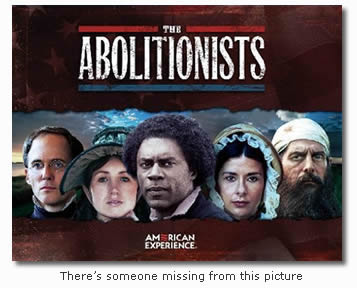
One of my favorite television programs is American Experience on PBS. Known for their well-produced and in-depth historical documentaries, American Experience has been simply killing it lately. “Death and the Civil War“ aired back in November, a film based on the fantastic book This Republic of Suffering by Drew Gilpin Faust. Recently, they aired another exceptional film titled “The Abolitionists“. A student of Civil War history, I couldn’t wait to see it. I’ve always been fascinated by the abolitionists and the significant role they played in the conflict.
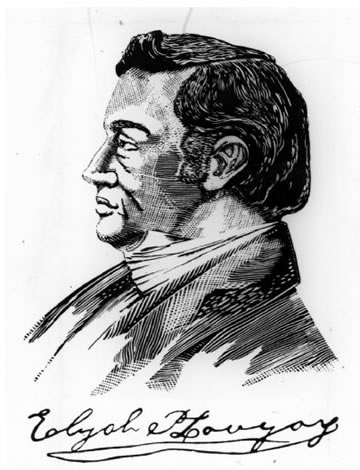
I was especially excited because the St. Louis area has ties to one of the earliest and most noteworthy abolitionists, Elijah Parish Lovejoy. Although familiar with his tragic murder in 1837, I didn’t know much about the rest of his life. I looked forward to learning more in the documentary.
I was disappointed to discover that he’s barely mentioned. Actually, the film could have been titled “The John Brown and Frederick Douglass Show”, since those two eat up most of the airtime (with a bit of William Lloyd Garrison and Harriet Beecher Stowe sprinkled in). Primary contributors to the movement for sure, but I think Lovejoy deserved more attention. In three hours of programming, his name is mentioned just once.
I think that’s a significant oversight. One of the earliest voices in the abolitionist movement, it was Lovejoy’s murder in that compelled the then-unknown John Brown to stand up in an Ohio church and dedicate his life to the abolition of slavery.
In fact, I think Lovejoy had such an impact, his story is a too good for just one blog post. For that reason, I’m splitting it into two. This week, I’ll discuss Lovejoy’s early years and his life as a newspaper editor in St. Louis. Next week, I’ll pick up the story when he moves north and meets his ultimate fate in Alton, Illinois.
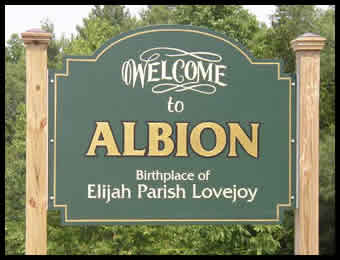
Elijah Parish Lovejoy was born in Albion, Maine on November 9, 1802. The eldest of nine children, he was simply called “Parish” by members of his family. His upbringing was profoundly religious. Well educated and a gifted student, Lovejoy graduated at the top of his class at Waterville College in Maine (now Colby College).
He began his career as a teacher in Maine, but didn’t find the occupation satisfying. The lure of the frontier appealed to him, and he decided to move west. He came to St. Louis in 1827 at the age of 25. Incorporated as a city just five years earlier, St. Louis at the time had a population of about 5,000 people. It was the wild west, and Lovejoy was about to become one of its most controversial residents.
While in St. Louis, he decided to try his hand at journalism. In 1830, he purchased one-half interest in a newspaper named the St. Louis Times. He spent the next two years working as its editor.
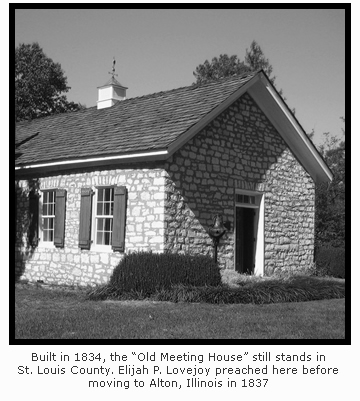
At this stage of his life, there were few signs that Lovejoy would become a leading voice in the growing abolitionist movement. Letters home focus more on religion and his difficulty fully embracing the fervent doctrine espoused by his parents. His early editorials in the St. Louis Times seldom mention the institution of slavery. Privately, he thought the institution was evil, but he believed that emancipation should be gradual, not immediate.
That would change in 1832, when Lovejoy attended a service at the 1st Presbyterian Church in St. Louis. On that day, an abolitionist named Reverend David Nelson addressed the congregation. His words made a significant impact on Elijah Lovejoy.
Nelson openly condemned the institution of slavery as evil. He attacked the selling of human beings as a sin as great as adultery and murder. As a result of Nelson’s speech, Lovejoy found his religious awakening and was soon converted. Befriending the fiery speaker, Nelson recognized Lovejoy’s abilities and counseled him to enter the ministry. Lovejoy took his advice, heading east to attend the Princeton Theological Seminary in New Jersey. Again finishing at the top of his class, Lovejoy returned to St. Louis and resumed his career as an editor, albeit with a far different voice.
He sold his stake in the St. Louis Times and started a new paper named the St. Louis Observer. It was to be a religious publication, dedicated to attacking frontier vices such as alcohol, tobacco, and “moral laxity”. In the early months of publication, only occasional references were made to slavery. Now a Presbyterian minister, he used the paper mainly as a platform for his religious beliefs. Displaying a defiant personality, Lovejoy was completely intolerant of any faith other than his own. He frequently attacked Baptists, Episcopalians, most of all, Roman Catholics. Referring to the faith as “Popery”, he condemned anyone remotely associated with the Roman Catholic Church.
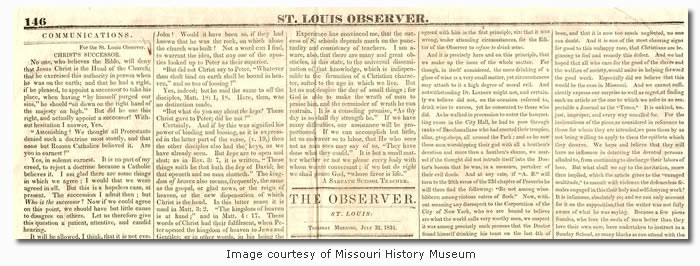
In 1834, the language of Lovejoy’s editorials begins to shift. The discussion of slavery becomes more common and confrontational. Although insisting that he was not an abolitionist, Lovejoy begins to demand for an immediate end to slavery. In an 1835 editorial, he writes: “The atmosphere of slavery is an unnatural one for Americans to live in. The institution is repugnant to the very first principles of liberty.”
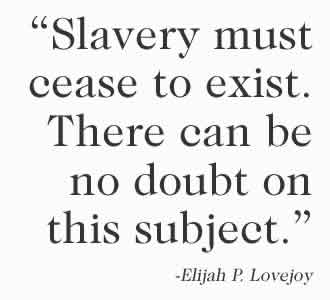
In the slave state of Missouri, the majority of the population wanted nothing to do with any form of emancipation, gradual or immediate. With each editorial, Lovejoy was increasingly viewed as a troublemaker and a destabilizing force in the city. Threats of tar and feathering, physical harm, and destruction of his newspaper operation became common. One local paper even posted handbills around the city calling for mob action to destroy his printing press.
Increasingly worried for his safety, Lovejoy’s friends and colleagues pleaded with him to ease his rhetoric. Lovejoy would have none of it. He responded defiantly that his rights to free speech and free press were constitutionally protected. He also didn’t hesitate to respond to threats by being provocative in return. When pro-slavery voices accused him of favoring interracial marriage, he raised the taboo subject of sexual abuse in a slave society. Claiming the raping of slaves by their masters was even worse than the physical torture of whips and lashes, Lovejoy enraged his detractors even further. Up to that point, nobody had printed anything like that in St. Louis.

Despite his defiance, one dramatic event changed everything for Elijah Lovejoy. In April 1836, a free black man named Francis McIntosh was involved in a scuffle on the St. Louis riverfront. It started when an unruly sailor was attempting to avoid arrest as McIntosh stood nearby. What happened next varies by account. Either McIntosh helped the man escape, or he ignored a request to assist in apprehending him. Either way, McIntosh was himself arrested and taken off to jail. Captured and charged with a crime in a slave state, McIntosh likely determined that his days of freedom were numbered. As two men led him to jail, McIntosh pulled a knife and lunged. One constable was killed and the other was seriously injured.
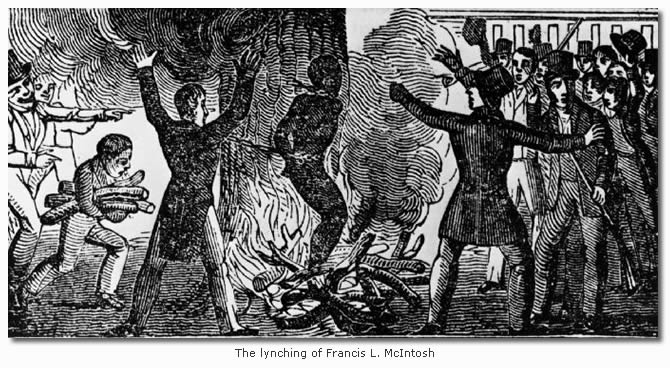
Captured again, McIntosh was locked up in jail. News of the event spread quickly through the city, and someone suggested McIntosh should be burned alive. A large mob soon gathered around the jailhouse, with over 2,000 enraged citizens clamoring for justice. Eventually, the mob broke through the door and pulled McIntosh from his cell. Dragged to the edge of town, McIntosh was chained him to a locust tree while wood was piled around him. The pyre was lit and McIntosh slowly started to burn. As the flames engulfed him, McIntosh pleaded for someone in the crowd to shoot him and put him out of his misery.
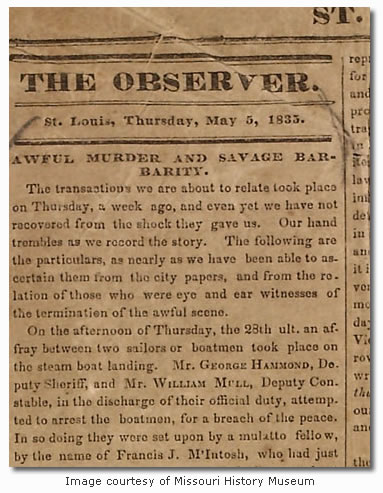
The fire burned for more than twenty minutes before McIntosh succumbed. With their task complete, the crowd quickly dispersed. With his charred remains left chained to the tree, a group of children began throwing rocks at his corpse in a game to see who could break the skull first.
Appalled by the event, Elijah Lovejoy went on the attack. In his next editorial, he harshly condemned the actions of the mob. Lamenting the lack of lawful society in St. Louis, he proclaimed it to be “savage barbarity”. He called for all who participated in the lynching to “seek forgiveness”.
A court was convened to investigate the lynching. Presiding over the grand jury was a judge named Luke Edward Lawless. A slave-owner himself, Lawless had no problem with the rough culture of his city. He proceeded to make one of the most amazing speeches in the history of our nation’s courts.
As he addressed the grand jury, Lawless stated that the death of Francis McIntosh was unlawful and tragic. However, he instructed the grand jury not to hold anyone guilty of the crime. He stated that since thousands were involved, the case was “beyond the reach of human law”. Lawless then produced copies of the St. Louis Observer and handed them to the jury. Reading specific anti-slavery quotes from the publication, he stated it was newspapers like the Observer that “fanaticize the negro and excite him against the white man”. By doing so, he laid blame squarely at the feet of Elijah P. Lovejoy. He then asked for action against Lovejoy, asking the grand jury to consider what could be done about press that causes “widespread mischief”.
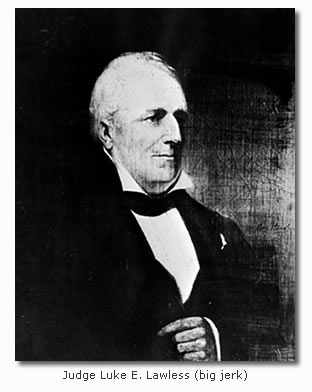
Despite Lovejoy’s scathing rebuttal in the next Observer editorial, the speech by Lawless was welcomed by the people of St. Louis. After alienating almost everyone in town, and for fear of physical violence against his family, Elijah Lovejoy announced that the Observer would be moved across the river to Alton, Illinois. Believing he’d have more support on free soil while being able to maintain St. Louis subscriptions, Lovejoy decided it was time to go.
On the same night his final editorial was published, a group of men gathered in St. Louis. Banging a drum as they marched through the streets, the mob quickly grew to over 200 men. They arrived at the front door of Lovejoy’s newspaper operation just after midnight. The door was broken down and contents of the building were attacked. Lovejoy’s printing press was broken apart and thrown in the Mississippi.
It was the first of Elijah P. Lovejoy’s printing presses to be destroyed and thrown in a river. There would be three more.
![]()
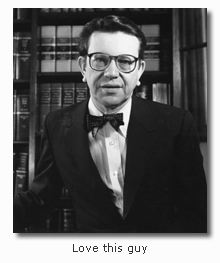
In my research for this post, I was pleased to find a biography written by none other than the late bow-tied Senator of Illinois, Paul Simon. His book Freedom’s Champion was a great introduction Lovejoy’s life. Simon should know a thing or two about Lovejoy, since he also worked as a newspaper editor in southern Illinois before entering politics.
As for getting the drink, this was a tough one. Lovejoy didn’t drink, and he didn’t care for drinkers. I couldn’t really go by location, because the Gateway Arch now stands where Lovejoy’s home and newspaper operation existed. The “Old Meeting House” where he preached still stands in St. Louis County, but there isn’t a bar anywhere near it. That left me with the event that ended his time in St. Louis, the Francis McIntosh lynching.
I read several accounts of that tragic event for this post. One claimed it happened “in the center of town”, but the general consensus was that McIntosh was dragged to the western outskirts of the city. What’s remarkable to remember is that in 1836, the outskirts of the city was less than a mile from the riverfront. The exact location is unknown, but a few accounts placed the episode somewhere near the intersection of 7th and Chestnut.
Thinking there must be a place to get a drink around there, I was horrified to find a Hooters at that exact intersection. I could only imagine what kind of hell would arrive in my glass if I ordered a cocktail there.
Just for fun, I decided to see what would happen if I did. At the very least, I figured it’d make for a good story.
I sat down at the bar and was greeted by the standard Hooters waitress. She was exceptionally friendly, squeezed into a shirt that was far too small, and absolutely clueless about how to make a Manhattan. She actually called me “Baby”.
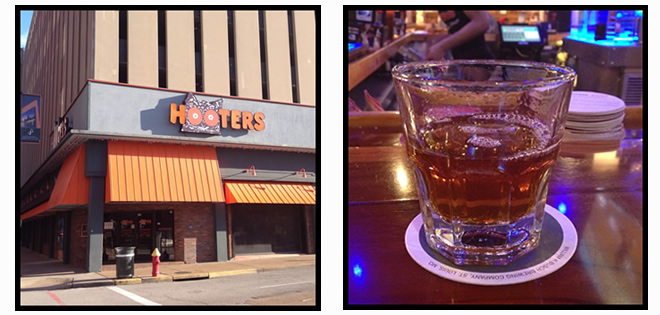
She ran off to get instructions from her manager. When she returned, I was pleasantly surprised when she asked me if I’d like it up or on the rocks (a good start). I ordered it up with Jack Daniels and she ran off again to make it.
As I waited for her return, I couldn’t get over the environment. First of all, the lighting in Hooters is glaring. It’s so bright in there, I felt like I was in a police lineup. Maybe that’s the point, but you certainly can’t drink in the shadows at a Hooters. Next to me at the bar was a guy who brought his girlfriend in for Valentines Day. I couldn’t help but smile as they exchanged kisses between bites of chicken wings.
My drink arrived in a rocks glass (cocktail glasses are not an option at Hooters). I think the ratio of whiskey to vermouth was at least five to one. In other words, I had a glass of whiskey. Surprisingly, no cherry was added. What’s weirder is that I watched the waitress shake it vigorously in ice, but the drink was lukewarm when I took a sip. I can offer no plausible explanation.
What a wretched drink snob I am, but I must say that the experience was really amusing. The staff was extremely friendly and fun about it. Even the manager came over and asked me if the drink was any good. I lied and said it was. Finally, he laughed and said “We don’t get that drink order in here very often”. Nope, I bet they sure don’t.
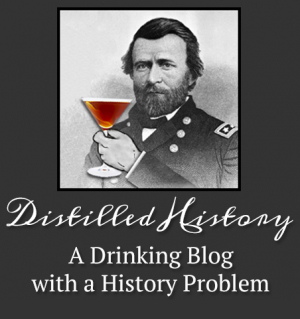

As always another great post.
awesome job telling the story
I, too, am fascinated by Elijah Lovejoy. It is really too bad that none of Rev. Lovejoy’s biographers were of his own religious persuasion (evangelical Protestant): that would give the biography much more depth. Interesting that you should call him “defiant” and “confrontational”. The more I read of him, the more I see that he was quite reasonable: other abolitionists such as Garrison and Douglass seem far more incendiary. Lovejoy lived in a world where truth was knowable and absolutes discernable. Indeed, if he did not obey them, Lovejoy would have felt he would have incurred moral guilt. I see similar claims of knowing absolutes on the “Black Lives Matter” website.